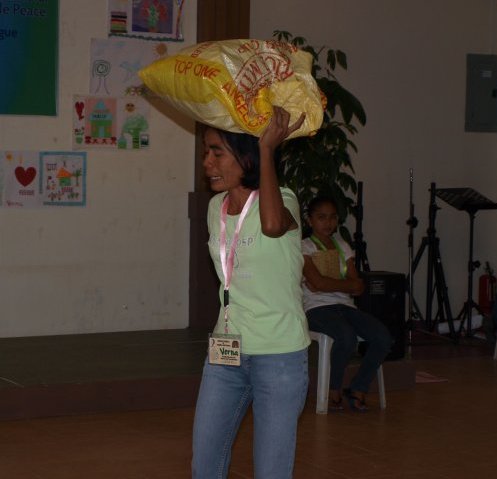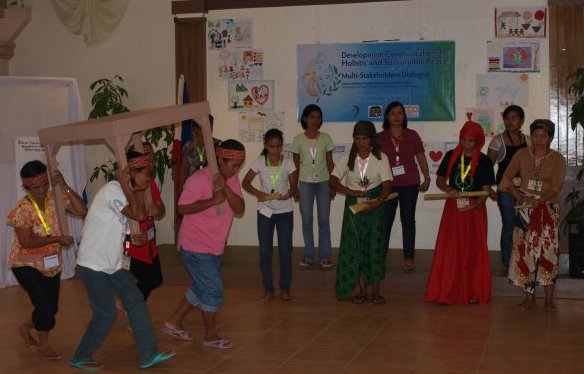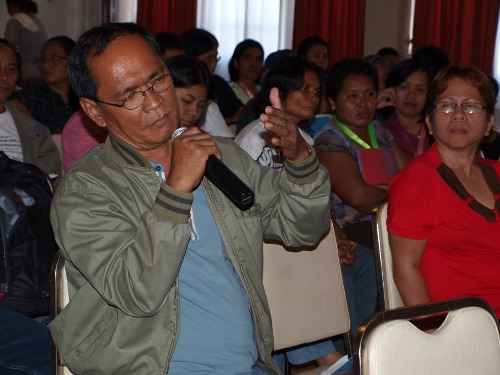 by Marion Cabrera, Isis International
by Marion Cabrera, Isis International
A woman's belongings and life in a sack; a day care teacher taking pride in how she has contributed to building a culture of peace by shaping the values of children under her care; a young leader's aspirations and dreams amidst a situation of conflict– these are but snippets of some stories shared by the women who participated in workshop conducted by Isis International and Balay Rehabilitation Center called Crafting Messages for Women and Peacebuilding: Workshop on Feminist Development Communications last May 24-29 in La Anclar, Davao City, Philippines. Read More
This five-day workshop is part of a two-year project on Cultural Politics of Conflict, Peace (CPCP) and the United Nations Security Council Resolution (UNSCR) 1325: Strategising and Capacity Building for Philippines and Indonesia.
The project has two phases, the first one involving a feminist action research that seeks to identify concrete ways women are able to participate in different areas of peacebuilding using cultural politics as a framework. The second phase is on capacity building in gender, peace, and development communications which aims to strengthen grassroots women leaders’ skills in peacebuilding.
The said workshop was designed to provide a venue for grassroots women to develop and enhance their knowledge on how to effectively communicate their experiences in armed conflict situations and their crucial role in peacebuilding.
Practitioners of integrated theatre arts and communications for development were invited to facilitate sessions for the five-day interactive workshop. Through their expertise and guidance, participants were given a chance to craft their stories using different forms of communication tools such as vignettes, monologues, dance, radio plugs and posters—all of which are found to be effective means in reaching out to other women in the communities.
At the workshop, participants shared that such training and capacity building opportunities are very empowering, saying that participating has allowed them to gain confidence and to take pride in what they do.
In particular, Fely, a farmer and community leader said that, “At first I was very reluctant. I thought I could not do [the workshop activities]. I did not know how. But as I was accomplishing the tasks, I realized that there are a lot of things I can do-- things I thought I was not capable of accomplishing.”
Capping the workshop was a multi-stakeholder dialogue on Development Communications for Holistic and Sustainable Peace held on May 29 also in La Anclar in Davao City, which was attended by 24 participants from local government, non-governmental organizations working on women and peace, as well as media partners from Davao and the neighboring provinces of General Santos, North Cotabato and Kidapawan.
During the dialogue Isis shared their learning journey with the women of Pikit and the importance of how interventions in peace and development need to be grounded in the lived-realities of women from the global south. Maureen Pagaduan, head researcher and consultant of the two year project shared that recognizing women's strength and resilience would not only be an instrumental framework for understanding the experience of peace and conflict but may also be a rich source of knowledge that can be tapped for a more innovative approach to peace and development interventions.
The dialogue also showcased a multimedia presentation of the peace messages crafted by the workshop participants as well as a presentation of a one-year communication and advocacy plan, they likewise developed.
Alicia, a local government worker, community volunteer and peace advocate who was among the presenters shared her thoughts on the role of women in the implementation of UNSCR 1325, “Let us, women, participate and work toward the implementation of policies that address our concerns. We have many policies in place that need implementation. There are very few of us, women, who know about [the UNSCR 1325]. What about those in the farthest and smallest localities? When will they know about these policies? These are the policies that we all should start working together to implement.”
The presentation and brief sharing from the participants was followed by a dynamic discussion of experiences as well as expression of commitments from various actors involved in peace and development ensued.
Maugan Mosaid, of the Municipality of Pikit talked about his municipality's gender mainstreaming experience through local policy development and the creation of more concrete programmes for women. He committed to developing a programme on “Food for Peace,” as a response to calls for government to pay attention to the immediate need for livelihood programmes for women. This will be patterned after the Municipal Social Welfare and Development's (DSWD) “Food for Work Programme,” where members of the community perform work for their area's rehabilitation and reconstruction in exchange for food.
 Mosaid also said he would bring together the other officials of Pikit to collaborate with other local governments on programmes and projects that can be adapted and implemented in his municipality.
Mosaid also said he would bring together the other officials of Pikit to collaborate with other local governments on programmes and projects that can be adapted and implemented in his municipality.
Moreover, local village leader, Mr. Omar Ungqui of Dalangaoen, committed to the call of gender inclusion by promising to have at least two women as part of the Village Council of Dalangaoen.
The sharing and commitments achieved in the workshop and at the multi-stakeholder dialogue comes very timely as states and other actors prepare for the 10th year celebration of UNSCR 1325. They serve as a resounding reminder of how women's participation in all areas of peacebuilding is a concern not only of women but of various stakeholders in peace and development work cutting across the local, national and international levels.





 The
The 
 Isis Resource Center holds one of the largest feminist collections of materials in the Global South. With 40 years of publication experience, Isis holds a vast collection.
Isis Resource Center holds one of the largest feminist collections of materials in the Global South. With 40 years of publication experience, Isis holds a vast collection.